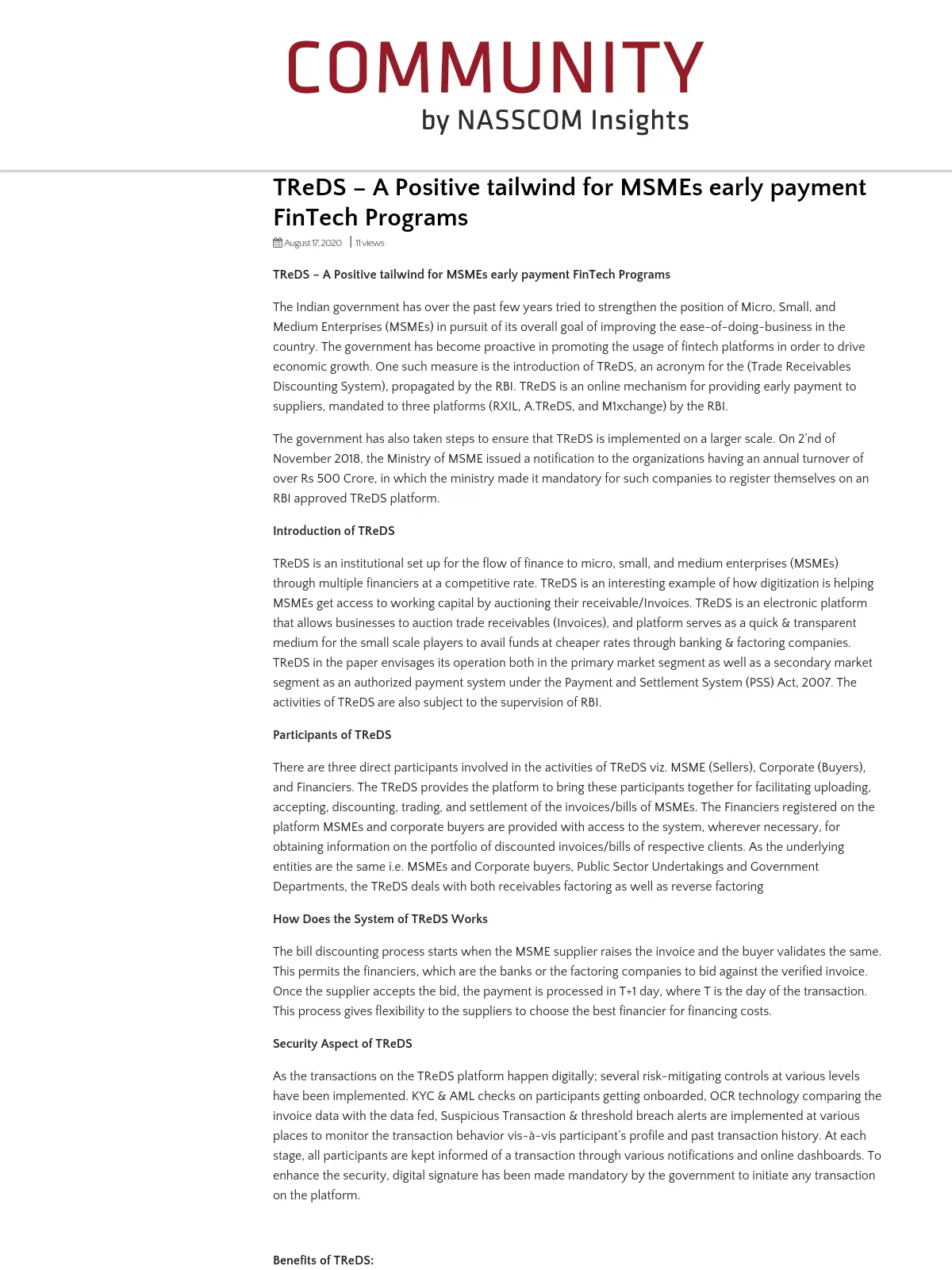TReDS – A Positive tailwind for MSMEs early payment FinTech Programs
Blog: NASSCOM Official Blog
TReDS – A Positive tailwind for MSMEs early payment FinTech Programs
The Indian government has over the past few years tried to strengthen the position of Micro, Small, and Medium Enterprises (MSMEs) in pursuit of its overall goal of improving the ease-of-doing-business in the country. The government has become proactive in promoting the usage of fintech platforms in order to drive economic growth. One such measure is the introduction of TReDS, an acronym for the (Trade Receivables Discounting System), propagated by the RBI. TReDS is an online mechanism for providing early payment to suppliers, mandated to three platforms (RXIL, A.TReDS, and M1xchange) by the RBI.
The government has also taken steps to ensure that TReDS is implemented on a larger scale. On 2’nd of November 2018, the Ministry of MSME issued a notification to the organizations having an annual turnover of over Rs 500 Crore, in which the ministry made it mandatory for such companies to register themselves on an RBI approved TReDS platform.
Introduction of TReDS
TReDS is an institutional set up for the flow of finance to micro, small, and medium enterprises (MSMEs) through multiple financiers at a competitive rate. TReDS is an interesting example of how digitization is helping MSMEs get access to working capital by auctioning their receivable/Invoices. TReDS is an electronic platform that allows businesses to auction trade receivables (Invoices), and platform serves as a quick & transparent medium for the small scale players to avail funds at cheaper rates through banking & factoring companies. TReDS in the paper envisages its operation both in the primary market segment as well as a secondary market segment as an authorized payment system under the Payment and Settlement System (PSS) Act, 2007. The activities of TReDS are also subject to the supervision of RBI.
Participants of TReDS
There are three direct participants involved in the activities of TReDS viz. MSME (Sellers), Corporate (Buyers), and Financiers. The TReDS provides the platform to bring these participants together for facilitating uploading, accepting, discounting, trading, and settlement of the invoices/bills of MSMEs. The Financiers registered on the platform MSMEs and corporate buyers are provided with access to the system, wherever necessary, for obtaining information on the portfolio of discounted invoices/bills of respective clients. As the underlying entities are the same i.e. MSMEs and Corporate buyers, Public Sector Undertakings and Government Departments, the TReDS deals with both receivables factoring as well as reverse factoring
How Does the System of TReDS Works
The bill discounting process starts when the MSME supplier raises the invoice and the buyer validates the same. This permits the financiers, which are the banks or the factoring companies to bid against the verified invoice. Once the supplier accepts the bid, the payment is processed in T+1 day, where T is the day of the transaction. This process gives flexibility to the suppliers to choose the best financier for financing costs.
Security Aspect of TReDS
As the transactions on the TReDS platform happen digitally; several risk-mitigating controls at various levels have been implemented. KYC & AML checks on participants getting onboarded, OCR technology comparing the invoice data with the data fed, Suspicious Transaction & threshold breach alerts are implemented at various places to monitor the transaction behavior vis-à-vis participant’s profile and past transaction history. At each stage, all participants are kept informed of a transaction through various notifications and online dashboards. To enhance the security, digital signature has been made mandatory by the government to initiate any transaction on the platform.
Benefits of TReDS:
- Unified electronic platform for Sellers, Buyers & Financiers.
- Best Discount rate as multiple financiers participate in auction
- Liquidity improves as there is easy/quick access of funds
- Allows MSMEs to post their receivables on the system and get them financed.
- Security of digital platform for confidentiality of information
- Corporates enjoy savings on procurement cost through improved negotiation of financing term for its vendors.
- Corporates save on the financing cost by extending their credit period and augmenting their payment cycle.
- Financiers, on the other hand have an opportunity to build PSL asset portfolio.
- TReDS can be integrated with the ERP systems and avoid manual processes
Future Forward for TReDS
Experts feel that continual government support and awareness can go a long way in countering the challenges being experienced. The government on its part has taken several initiatives recently to boost the TReDS exchanges. All advances under TReDS are categorized as Priority Sector Lending for banks who participate, thus widening eligibility of MSMEs. In his 12 point agenda to spur growth and boost the revival of the MSME sector last year, Prime Minister Narendra Modi had also made it mandatory for companies with a turnover of Rs 500 crore and above to join TReDS so that cash flow does not pose a deterrent to this sector.
The enthusiasm seems to have caught ongoing by the increasing numbers of players coming on board every other day on these platforms. “The TReDS program is modernizing and bringing up India. A huge shift has happened, the volume of transactions on TReDS platforms as well as the volume of onboarding of large corporates reflects their confidence in the system. Making it mandatory will only help in changing the style and attitude.”
The post TReDS – A Positive tailwind for MSMEs early payment FinTech Programs appeared first on NASSCOM Community |The Official Community of Indian IT Industry.
